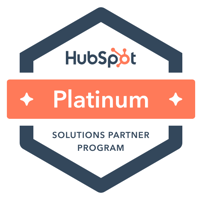Let's talk about what HubSpot reporting is, how can you leverage it to your company's advantage, as well as how you can maximize your HubSpot reporting ROI.
What is HubSpot Reporting?
HubSpot Reporting Software is a component of HubSpot's CRM system. It enables users to design and implement customized dashboards, which pull metrics from the platform's robust analytics tools and then organize them into the desired reports. You can use these dashboards as the basis for presentations at the team and executive meetings. You can also use the insights you uncover as guideposts for developing and refining your overall sales strategy.
Since HubSpot's CRM functions as a "one-stop-shop" for sales and marketing, its reporting features can play a key role in generating a higher number of leads, sales, and repeat customers.
The 3 Aspects of HubSpot Reporting
HubSpot Reporting Software has many moving parts. However, the CRM's built-in reporting features can be divided into three basic categories: reports, analytics, and dashboards.
1. Reports
At its most basic level, HubSpot reporting includes default reports for marketing, service, as well as sales. Even without integrated analytics tools, HubSpot reports providing basic summaries that can yield insights into current business performance.
Of course, many other reporting features are available within the HubSpot ecosystem, such as the HubSpot Reporting Add-On, which costs $200/month. This add-on simplifies reporting for sales and marketing by combining all reports into one centralized interface. As you can imagine, this approach often works wonders in terms of alignment between sales and marketing. In addition, the Reporting Add-On supports hundreds of pre-set dashboards and allows for the creation of countless customized reports.
2. Analytics
If you want to dig a little bit deeper than the default reports built into HubSpot's CRM, then the platform's analytics tools may be the perfect solution for you. HubSpot Analytics allows you to look at a wealth of raw data in order to identify key market trends and customer behavior patterns. In turn, you'll be able to take those insights and inform your sales and marketing strategies moving forward.
3. Dashboards
HubSpot's built-in dashboards can provide an overview of different reports. These apply to your marketing, sales, as well as service departments. For instance, the default marketing dashboard will highlight metrics like conversion rate, page views, clicks, click-through rate, email open rate, and so forth. The sales dashboard includes data on productivity and sales performance, such as deals closed-won, deals closed lost, deals forecast, and team goals. And your service dashboard provides information on support tickets, ticket resolution rates, and performance feedback.
Again, these built-in dashboards are a great way to access basic summaries of each team's overall performance. They also come with fairly robust customization capabilities, as you can customize the reports for each department.
What are the Benefits of HubSpot Reporting?
There are several advantages that you can gain by utilizing HubSpot's reporting system. Here are just a few big ones to consider:
HubSpot can serve as a "single source of truth" for your reporting needs.
Many companies use HubSpot CRM as a standalone platform. Even without additional integrations and tools, you can create customized reports for each of your key departments. You can also keep your key data points stored in a centralized location that all key stakeholders can easily access. (Of course, the HubSpot Reporting Add-On refines such centralization to an even greater degree.)
It is user-friendly and can "cut through the noise."
Any CRM system comes with a learning curve, but HubSpot's is a lot "gentler" than others. One reason for this is the fact that HubSpot's baseline reporting doesn't go in-depth into granular data sets that marketers and sales reps don't really need. In effect, HubSpot reports can "cut through the noise" of an oversaturated data stream.
It allows you to track the entire customer journey on one platform.
From the prospect's initial contact with your company to the resolution of the customer's service issue, you can trace a customer's entire journey with your brand through transactional data recorded within the HubSpot CRM. When the outcomes of such customer journeys are compiled and analyzed, it becomes much easier to identify and address key bottlenecks in the sales process.
In summary, HubSpot reporting can help you to identify key trends and patterns in the market, understand your customers better, and ultimately grow your business.
If you'd like to learn more about how to leverage HubSpot reporting into sustainable growth for your company, reach out to our team of experts at OverGo Studio today for a free consultation.
Take advantage of our free Hubspot CRM Configuration to start modernizing your sales process. This is a limited-time offer where we will design a sales pipeline specifically for your business. Start generating more revenue and improve your close rates by building your first high-performing sales pipeline on HubSpot at no cost. Simply schedule a discovery session with our team of HubSpot experts.


